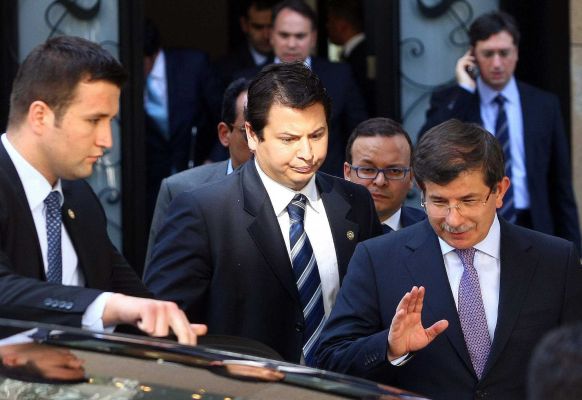Turkey calls for NATO meeting on fighter jet downed by Syria
Turkey has called a NATO meeting to discuss its response to the shooting down of one of its warplanes by Syrian forces on Friday.
Ankara has invoked Article 4 of NATO’s charter, under which consultations can be requested when an ally feels their security is threatened, officials say.
Earlier, Turkey’s foreign minister said the F-4 Phantom was in international airspace when it was shot down.
Syria has insisted the jet was engaged while it was inside its airspace.
It has also said no act of hostility was intended, noting that as soon as the military discovered the “unidentified” aircraft was Turkish its navy joined efforts to rescue the two crew members.
The Turkish foreign ministry said it knew the coordinates of the jet, which was in Syrian territorial waters at a depth of 1,300 m (4,265 ft), but has not yet found it.
The coast guard is still searching for the crew in the Mediterranean Sea, though hopes are fading of them being found alive.
The government has also issued a diplomatic protest note to Syria.
NATO spokeswoman Oana Lungescu said the North Atlantic Council, the principal political decision-making body within the military alliance, would meet in Brussels on Tuesday to discuss the incident.
“Turkey has requested consultations under Article 4 of NATO’s founding Washington Treaty,” she told Reuters.
“Under article 4, any ally can request consultations whenever, in the opinion of any of them, their territorial integrity, political independence or security is threatened.”
Turkey wants to be sure of the strongest backing once it decides its official response.

Foreign Minister Ahmet Davutoglu became the first senior Turkish official to challenge Syria's account of the downing of the jet
The government has promised that it will be strong, decisive and legitimate, and that it will share all the information it has with the public.
Earlier, Foreign Minister Ahmet Davutoglu became the first senior Turkish official to challenge Syria’s account of the downing of the jet.
After lengthy meetings with military chiefs, he told TRT state television that the unarmed jet had “momentarily” entered Syrian airspace by mistake on Friday but had left when it was shot down 15 minutes later.
“According to our conclusions, our plane was shot down in international airspace, 13 nautical miles (24 km) from Syria,” he said.
According to international law, a country’s airspace extends 12 nautical miles (22.2 km) from its coastline, corresponding with its territorial waters.
Ahmet Davutoglu also insisted that the jet had not been on a “covert mission related to Syria” but had instead been carrying out a training flight to test Turkey’s radar capabilities.
He said the plane had not “shown any hostility”, been clearly marked as Turkish, and that he did not agree with the Syrian military’s statement that it had not known to whom it belonged.
The Turkish military said it lost radio contact with the F-4 Phantom at 11:58 (08:58 GMT) on Friday while it was flying over Hatay province, about 90 minutes after it took off from Erhac airbase in the province of Malatya, to the north-west.
Later, the Syrian military said an “unidentified air target” had penetrated Syrian airspace from the west at 11:40 local time (08:40 GMT), travelling at very low altitude and at high speed.
It said that in line with the laws prevailing in such cases, Syrian air defences engaged the craft, and scored a direct hit about 1 km (0.5 nautical miles) from its coastline.
It burst into flames, and crashed into the sea at a point 10 km (5 nautical miles) from the village of Om al-Tuyour, off the coast of Latakia province, well within Syrian territorial waters, the statement added.
Relations between NATO-member Turkey and Syria, once close allies, have deteriorated sharply since the uprising against Syrian President Bashar al-Assad began in March 2011. More than 30,000 Syrian refugees have fled the violence across the border into Turkey.
